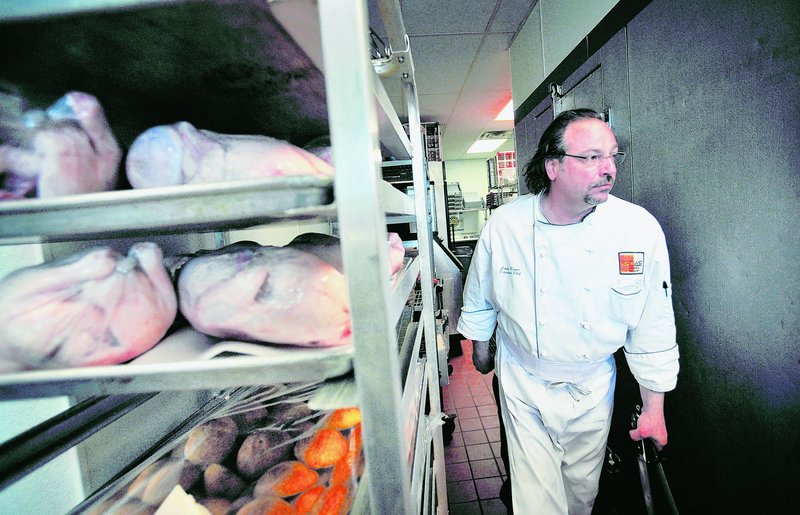There’s still no such thing as a free lunch, but new online discount coupons are slicing restaurant prices to the bone.
While recession-weary consumers may be happy to buy a $50 dinner for $25 at Web sites like Groupon.com, a participating restaurant makes only $12.50 – an unprofitable deal for the restaurant.
Groupon.com, one of several deep-discount Web sites, claims it can help restaurants, health spa operators and other retailers reach new consumers who can be turned into repeat customers.
“You may barely break even on Groupon customers the first time,” said David Rangel, Groupon’s director of merchant services. “But if you bring them back once or twice, you’ll get a terrific return.”
One restaurant owner called Groupon’s program “borderline predatory” because it’s aimed at restaurants hurting from the recession.
“They know the restaurant industry is on the ropes, and they are offering people a quick fix. They are preying on people’s fears,” said Lenny Russo, chef and co-owner of Heartland Restaurant in St. Paul, Minn., who refused to participate in the coupon program.
The coupon deals jeopardize the restaurant industry, bringing short-term revenue, though not enough to cover the cost of buying, preparing and serving the food, he said.
Others say it takes time to tell whether Groupon will hurt restaurants or boost traffic as promised. Restaurants can control their costs by restricting the number of coupons – known as Groupons – that can be sold.
Chicago-based Groupon Inc. does business in 40 metro markets, including Boston. Its competitors include Restaurant.com, which offers discounts on restaurants in southern Maine, LivingSocial, DealStork and CrowdCut.
Groupon approaches restaurants with this pitch: Offer highly discounted meals through Groupon.com packaged as exclusive daily “deals.” Consumers get a short time to purchase online and must pay in advance. The deal goes through only if a specified number of consumers – say, 50 – opt to buy. Hence the name Groupon.
The message to consumers: Tell your friends about this so enough deals will be sold.
The deals carry a discount in the range of 50 percent. Groupon keeps half the revenue that consumers pay online, leaving the restaurant with about 25 percent.
Marketing experts say the 50 percent Groupon discount is a big departure from traditional offers, which range from 5 percent to 20 percent off.
“This is a new variation on sales promotion,” said Dave Brennan, a marketing professor at the University of St. Thomas in St. Paul. “The money for the coupon is paid up front, and the discount is very heavy.”
Some restaurants are giving Groupon a try.
Karl Greeman, co-owner of the Minneapolis restaurant Spill the Wine, said the restaurant sold 868 Groupons in a recent offer on the Web site, near the maximum number of 1,000 he was willing to authorize.
Greeman and his wife and business partner, Katie, “went into it knowing what food costs and what our overhead is. You’re giving a certain percentage of your bottom line away. But if that generates business and puts money on the bottom line, it will be a good thing.”
Their revenue calculation assumes about 30 percent of the Groupons won’t be redeemed because they’ll be lost or forgotten by the purchasers – a concept known as “breakage” in the coupon business.
Because the Groupons are good for a year, and nearly two-thirds of those for Spill the Wine haven’t been used yet, it will be several months before the Greemans find out if they were right.
“We’ve only used Groupon once, and we’re waiting to see how it pans out,” Karl Greeman said, adding, “If a restaurant is in financial trouble, this is not a way to get out of it.”
The larger question is whether online deep discounters have discovered a long-term business model that will survive hard times.
Groupon says it doesn’t need a recession to succeed. It promises restaurants more than a short-term burst of traffic. Groupon users, the company says, are a highly desirable group, mostly women 18 to 35 who dine out often.
Others are skeptical that deep-discount Web sites have staying power.
“I think it’s a short-term phenomenon that has legs now because we’re in a deep, long-lasting recession,” Brennan said. “As things get better, restaurants will not need to do it, and fewer consumers will look for it.”
Larry Chiagouris, a marketing professor at Pace University in New York, predicts that “companies like Groupon will last beyond the recession, but they’ll probably never be very big. If a business has a new product or location, a Groupon can bring it to the public’s attention. But if a business is known and already has a good product, it shouldn’t need to discount what it does.”
Send questions/comments to the editors.



Success. Please wait for the page to reload. If the page does not reload within 5 seconds, please refresh the page.
Enter your email and password to access comments.
Hi, to comment on stories you must . This profile is in addition to your subscription and website login.
Already have a commenting profile? .
Invalid username/password.
Please check your email to confirm and complete your registration.
Only subscribers are eligible to post comments. Please subscribe or login first for digital access. Here’s why.
Use the form below to reset your password. When you've submitted your account email, we will send an email with a reset code.